
People who cash out their mutual funds usually face tax consequences but it’s much simpler for those who inherit the funds.
Tracking the price paid for mutual fund shareholders is necessary to know the original value at the time of purchase in order to account for income from the funds and pay the capital gains tax. However, as the Motley Fool explains in “Taxes on Inherited Mutual Funds,” people who inherit shares in mutual funds often have a much simpler time.
There are three things you need to know if you inherit a mutual fund or are considering leaving one to your heirs:
- Step-Up Basis – No matter when a share was purchased or its purchase price, the initial value assigned to an heir is the value at the time of death. That means any gains made previously are tax free.
- Retirement Accounts – Mutual funds contained in IRAs or other retirement accounts are more complicated. People who inherit them do not receive a step-up basis and must pay the same ordinary income taxes as the person who created the account. It is best to consult with an expert about what type of account you have and what the tax consequences are if you are not certain.
- Estate Taxes – Mutual funds, whether in retirement accounts or not, are treated as part of a deceased person’s estate and can trigger the estate tax. While the estate pays any estate tax due before distributing assets to heirs it is important to note that the inheritance could be less than expected because of the tax.
Reference: Motley Fool (Jan. 4, 2016) “Taxes on Inherited Mutual Funds”











